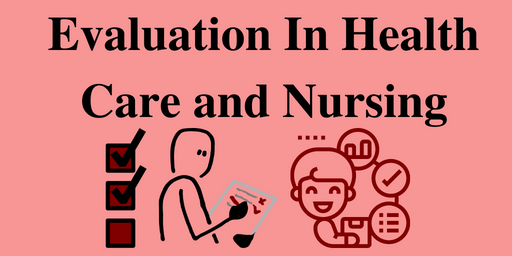The Evaluation In Health Care and Nursing. Evaluation In Health Care Evaluation is a systematic method for measuring the effects of purposeful actions or interventions on specific situations.
The Evaluation In Health Care and Nursing
It involves assessing the worth or value of an intervention, program, or practice by analyzing both anticipated and unanticipated outcomes. This process provides critical information to decision-makers who have a vested interest in the results of the intervention. Evaluation plays a vital role in various fields, including healthcare, education, and social services, as it helps to ensure that practices are effective and resources are used wisely.
Evaluation Methods or Types
Evaluation methods can be categorized along a continuum that ranges from simple assessments to comprehensive evaluation research. At one end, informal practices may be employed to identify indications of outcomes; at the other, rigorous research methods allow for generalization to comparable situations. While informal practices might serve as initial indicators, they lack the systematic approach needed for robust evaluation. Thus, the term “evaluation” should encompass all efforts that involve a systematic process to determine the effects of interventions on anticipated outcomes.
First Type Evaluation
According to Rossi and Freeman (1985), evaluations serve one of three primary purposes:
- Conceptualization and Design of Interventions: This type of evaluation involves understanding the extent of a problem needing intervention, identifying target populations, evaluating whether the proposed intervention will effectively address the issue, and maximizing the likelihood of a successful outcome.
- Monitoring Implementation: Studies in this category focus on what actions are taken during an intervention. Often termed process evaluations, these studies assess whether the intervention reaches its intended population and whether the implementation aligns with the original design. While they are essential for determining cause-and-effect relationships, process evaluations alone are insufficient for measuring impact. Researchers often err by concluding data collection once they have described the intervention’s processes.
- Assessing Impact and Cost-Efficiency: This type evaluates both the degree of an intervention’s impact and its cost-effectiveness. The effectiveness of an intervention refers to its actual impact, while efficiency pertains to the cost associated with achieving that impact.
Recent literature emphasizes the importance of theoretical frameworks in guiding evaluations. Various theories are applied, from those focused on intervention design to those outlining expected relationships between interventions and outcomes. For example, behavioral theories are commonly used to develop health behavior change interventions, while evaluation theories focus on the purpose of the study, such as determining relevant goals or understanding the conditions under which certain outcomes occur.
Measuring the Effectiveness of Interventions
Measuring the true effect of an intervention can be challenging due to various factors that affect evaluation studies. Common issues include the need to quantify the extent of the intervention introduced. This information is crucial for establishing cause-and-effect relationships and clarifying the required magnitude of an intervention before an effect is observed.
Types of Errors in Evaluation Research
Ingersoll (1996) identifies several types of evaluation errors that can undermine the validity of findings:
- Type III Error: This error occurs when the wrong problem is addressed, often stemming from improper implementation or insensitivity in measuring outcomes.
- Type IV Error: This error arises when the information provided is irrelevant or unhelpful to stakeholders, compromising the utility of the evaluation.
- Type V Error: This involves confusing statistical significance with practical significance, which can lead to Type IV errors. Researchers may mistakenly conclude that results are meaningful based solely on statistical analyses without considering their real-world implications.
Importance of Rigor
To ensure that evaluations are meaningful and impactful, rigorous methodologies must be employed throughout the evaluation process. Evaluators should design studies using well-defined conceptual frameworks, pay close attention to measurement rigor, and focus on maximizing the robustness of methods and analyses. This level of diligence enables the rejection of alternative hypotheses and strengthens the credibility of the evaluation findings.
Benefits or Purposes of Evaluation
Evaluation serves several critical purposes within healthcare and nursing research:
- Measurement of Intervention Magnitude and Effect: Evaluations help quantify the extent of intervention implementation and its effects on outcomes. This quantitative assessment allows healthcare professionals to determine the effectiveness of various interventions.
- Informed Decision-Making: By providing evidence about the effectiveness and efficiency of interventions, evaluations equip decision-makers with the information needed to allocate resources wisely and make informed choices about healthcare practices.
- Improvement of Practices: Evaluation results can identify areas for improvement, leading to enhanced care quality and patient outcomes. By understanding what works and what does not, healthcare providers can refine their practices to better serve patients.
- Accountability: Evaluations establish accountability among healthcare providers and institutions by documenting the effectiveness of interventions. This transparency fosters trust and confidence among stakeholders, including patients, families, and funding agencies.
- Foundation for Future Research: Evaluations can lay the groundwork for future studies by identifying gaps in knowledge or areas requiring further investigation. This iterative process of evaluation and research strengthens the evidence base in nursing and healthcare.
In summary, evaluation is essential for measuring the effectiveness of nursing interventions, providing valuable insights into healthcare practices, and guiding future research efforts. By employing rigorous methodologies and focusing on relevant outcomes, evaluators can contribute significantly to the improvement of patient care and health outcomes.
Read More:
https://nurseseducator.com/didactic-and-dialectic-teaching-rationale-for-team-based-learning/
https://nurseseducator.com/high-fidelity-simulation-use-in-nursing-education/
First NCLEX Exam Center In Pakistan From Lahore (Mall of Lahore) to the Global Nursing
Categories of Journals: W, X, Y and Z Category Journal In Nursing Education
AI in Healthcare Content Creation: A Double-Edged Sword and Scary
Social Links:
https://www.facebook.com/nurseseducator/
https://www.instagram.com/nurseseducator/
